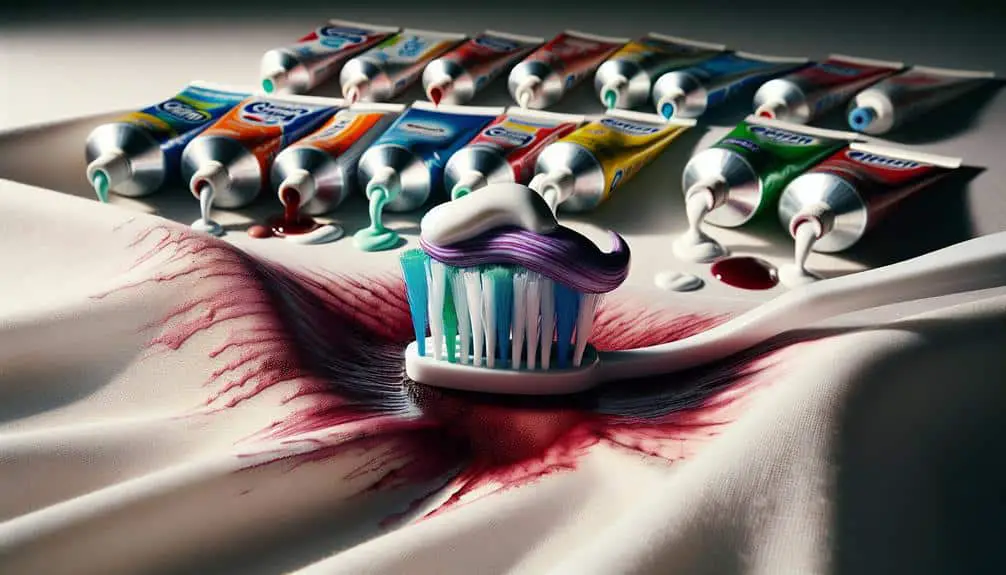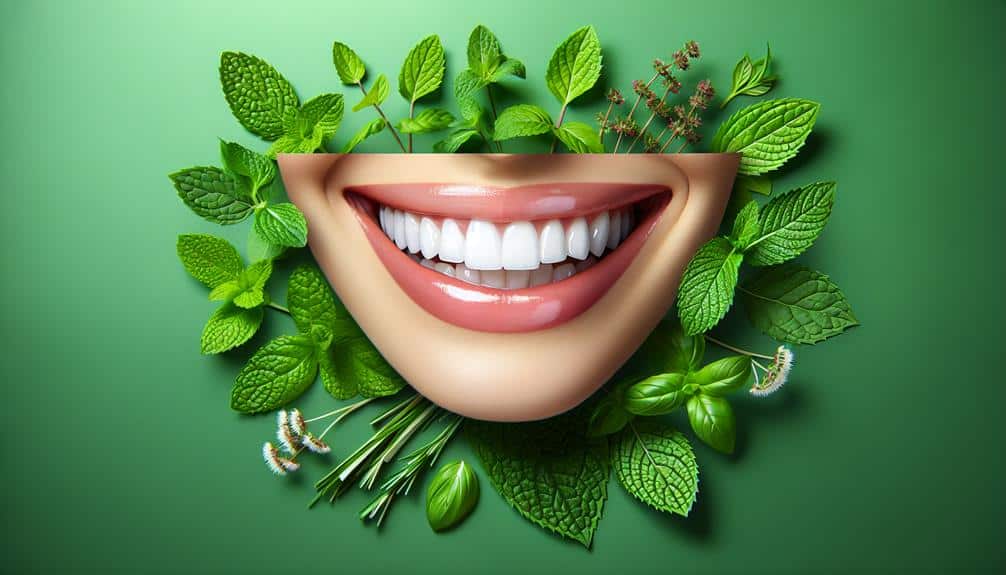To effectively remove wine stains from your teeth, consider using charcoal whitening toothpaste, baking soda whitening toothpaste, hydrogen peroxide toothpaste, baking soda & peroxide combo, or natural whitening toothpaste. Charcoal toothpaste gently scrubs away surface stains and neutralizes mouth acids, while baking soda offers a mild abrasive to break down stains without enamel damage. Hydrogen peroxide is known for whitening and antibacterial properties, while the baking soda & peroxide combo effectively combats wine stains.
Natural whitening toothpaste, incorporating oil-pulling ingredients and herbal benefits, provides a more natural approach to stain removal. Give your smile the care it deserves with these toothpaste options.
Key Points
- Baking Soda & Peroxide combo effectively removes wine stains.
- Charcoal Whitening toothpaste gently eliminates surface wine stains.
- Hydrogen Peroxide toothpaste whitens teeth and fights wine stains.
- Natural Whitening toothpaste with oil-pulling ingredients helps combat wine stains.
- Baking Soda Whitening toothpaste breaks down wine stains safely.
Charcoal Whitening Toothpaste
For effective removal of wine stains, consider using charcoal whitening toothpaste. Charcoal toothpaste offers several benefits that make it a popular choice for stain removal. The activated charcoal in these toothpastes acts as a gentle abrasive that helps to remove surface stains effectively without causing damage to the enamel. Additionally, charcoal toothpaste can help to neutralize acids in the mouth, reducing the likelihood of stains setting in.
Despite its benefits, there are some myths surrounding charcoal toothpaste that may deter individuals from using it. One common misconception is that charcoal toothpaste is too abrasive and can wear down the enamel. However, when used correctly and in moderation, charcoal toothpaste is safe for enamel. Another myth is that charcoal toothpaste can whiten teeth instantly. While it can help remove surface stains, it may take some time to see significant whitening results.
Baking Soda Whitening Toothpaste
Consider incorporating baking soda whitening toothpaste into your oral care routine for effective and gentle teeth whitening. Baking soda benefits in toothpaste include its mild abrasive nature, which aids in removing surface stains without causing damage to the enamel. Its whitening properties are due to its ability to break down stains and help restore the natural whiteness of your teeth.
Baking soda is a popular ingredient in whitening toothpaste because it can gently polish away stains caused by foods like wine, coffee, or tea. This ingredient is known for its ability to neutralize acids that contribute to tooth discoloration, making it an excellent choice for maintaining a bright smile. The gentle abrasiveness of baking soda helps to lift away stains while being safe for daily use.
When choosing a baking soda whitening toothpaste, look for one that has fluoride to help strengthen enamel and prevent cavities. Incorporating this type of toothpaste into your oral care routine can help you achieve a whiter, brighter smile with consistent use.
Hydrogen Peroxide Toothpaste
When looking to enhance your oral care routine, explore the benefits of hydrogen peroxide toothpaste for its teeth-whitening properties and potential stain removal capabilities. Hydrogen peroxide toothpaste can be a valuable addition to your dental hygiene regimen, offering more than just standard cleaning. Here are some reasons why you might consider incorporating it into your routine:
- Teeth Whitening: Hydrogen peroxide toothpaste is known for its ability to help whiten teeth, giving you a brighter smile.
- Stain Removal: The bubbling action of hydrogen peroxide can assist in lifting surface stains from the teeth, aiding in the removal of wine or coffee stains.
- Antibacterial Properties: Hydrogen peroxide has antibacterial properties that may help in reducing harmful bacteria in the mouth, serving as one of the mouthwash alternatives.
Baking Soda & Peroxide Combo
Enhance your dental hygiene routine with the powerful combination of baking soda and hydrogen peroxide for effective stain removal and teeth whitening. This dynamic duo isn't only a staple in many home remedies but also a proven method for combating wine stains on your teeth. The abrasiveness of baking soda helps scrub away surface stains while the antibacterial properties of hydrogen peroxide work to disinfect and whiten your teeth.
When it comes to wine stain prevention, incorporating a baking soda and peroxide combo into your oral care routine can be highly effective. These ingredients, when combined, create a potent solution that targets stubborn stains caused by red wine consumption. Regular use of this mixture can help prevent wine stains from setting in and keep your teeth looking bright and clean.
To utilize this method, simply mix a small amount of baking soda with hydrogen peroxide to form a paste. Brush your teeth gently with this mixture for a couple of minutes, then rinse thoroughly. Remember, consistency is key when using home remedies like this, so make it a part of your regular dental care routine for best results.
Natural Whitening Toothpaste
To build on the effectiveness of the baking soda and peroxide combination, consider incorporating a natural whitening toothpaste into your dental care routine. Natural whitening toothpaste offers a gentle yet effective way to maintain a bright smile while also focusing on oral health.
Here are some benefits of using natural whitening toothpaste:
- Oil pulling benefits: Some natural whitening toothpaste options contain ingredients like coconut oil, which is known for its oil-pulling properties. Oil pulling can help remove toxins and bacteria from your mouth, contributing to fresher breath and healthier gums.
- Ayurvedic oral care: Many natural whitening toothpaste products draw inspiration from Ayurvedic oral care practices, incorporating herbs and natural ingredients like neem and tulsi. These ingredients have been traditionally used in Ayurveda for their oral health benefits, promoting gum health and overall oral hygiene.
- Gentle whitening: Natural whitening toothpaste typically uses ingredients like baking soda, activated charcoal, or silica to gently remove surface stains without causing damage to tooth enamel, offering a more natural approach to achieving a brighter smile.
Frequently Asked Questions
Can Using These Whitening Toothpastes Cause Any Damage to Tooth Enamel?
When you're contemplating whitening toothpastes, it's essential to prioritize enamel protection. Some whitening options may pose sensitivity risks due to their ingredients. Make sure you select a product that balances whitening effectiveness with enamel safety for best results.
Are There Any Specific Toothpastes That Work Better for Red Wine Stains Compared to White Wine Stains?
For red wine stains, toothpaste with baking soda and hydrogen peroxide can help. It's more abrasive and better at stain removal. White wine stains are usually lighter, so standard whitening toothpaste should suffice.
How Frequently Should These Whitening Toothpastes Be Used to Effectively Remove Wine Stains?
For best results in removing wine stains and maintaining tooth enamel health, use whitening toothpaste every day. However, to prevent enamel damage, consider alternating with a non-whitening toothpaste. This approach balances stain removal efficacy, especially for stubborn coffee stains.
Are There Any Potential Side Effects of Using These Whitening Toothpastes for Stain Removal?
Like a skilled navigator, you must chart the territory of potential risks when using whitening toothpaste. Sensitivity concerns may arise, and understanding long term effects and ingredient safety is essential for your dental health.
Do These Toothpastes Also Help With Removing Other Types of Stains, Such as Coffee or Tea Stains?
When it comes to removing wine stains, some toothpastes can work on coffee and tea stains too. The abrasive nature of toothpaste helps scrub away surface stains, but results may vary based on the stain's intensity and type.




